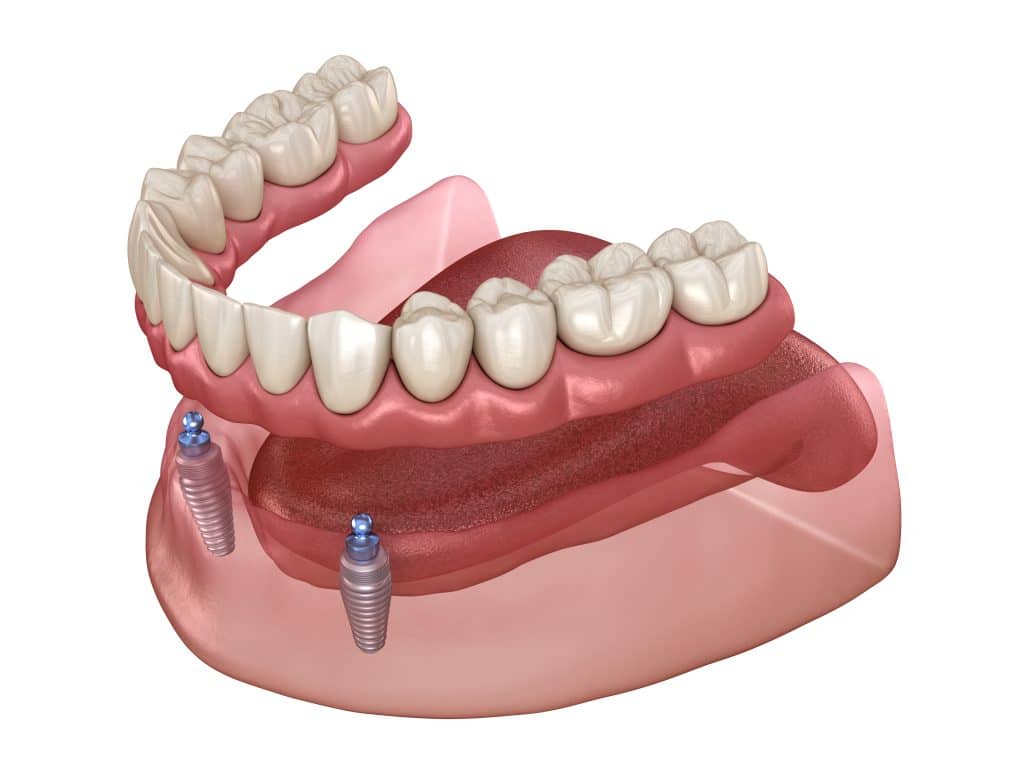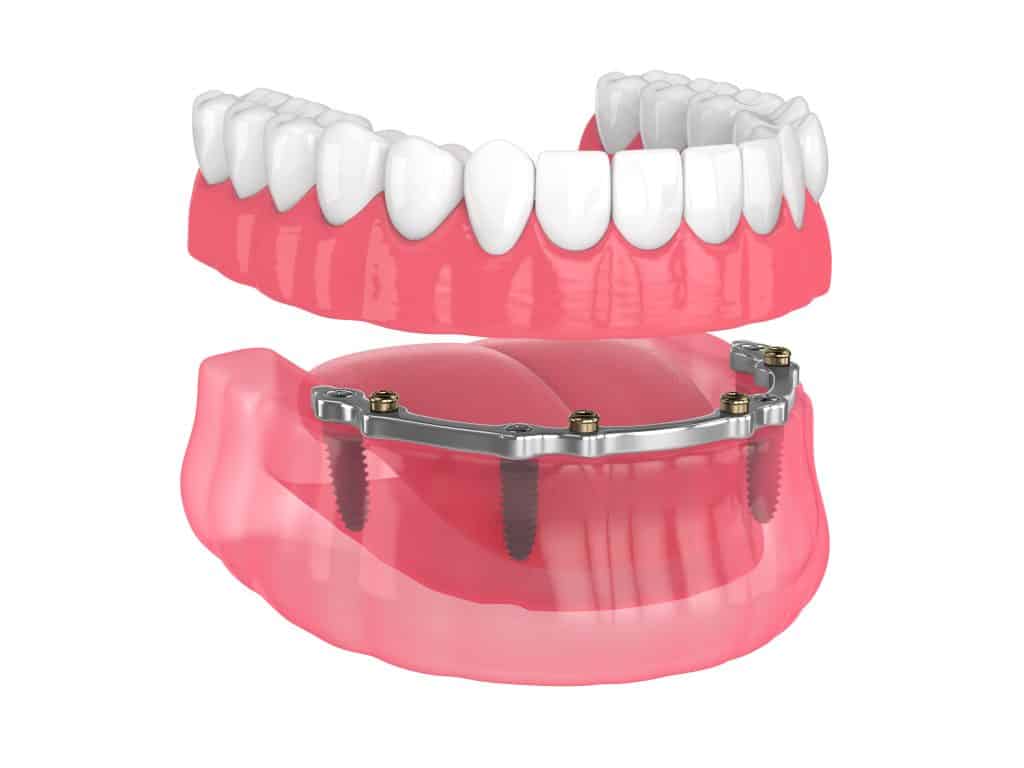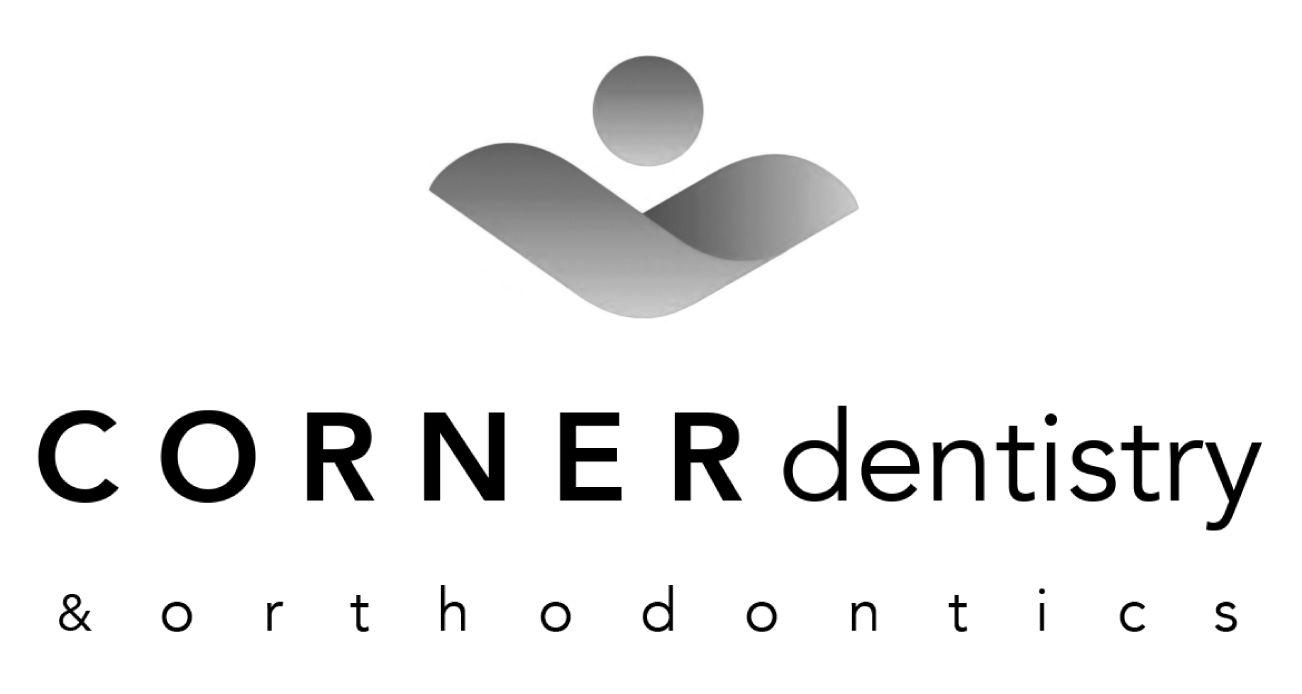Tooth loss can impact not only your confidence, but your health as well, making it more difficult to eat and get the nutrients you need. At Corner Dentistry & Orthodontics, we offer overdentures to help replace your missing natural teeth and improve your quality of life.
Overdentures can be a great substitution to traditional dentures, but they may not be right for everyone. Learn more about overdentures and if you are a good candidate for them.
What Are Overdentures?

Like traditional dentures, overdentures are dental prosthetics which help alleviate the problem of missing teeth. Regular dentures sit on the gums where your natural teeth once were and rely on either suction or an adhesive to remain in place. In comparison, overdentures are supported by dental implants which help to keep them in place, giving you a more natural feeling. The extra support lets you eat, drink, and speak with more comfort and ease compared to traditional dentures.
Depending on your needs, overdentures can be fixed or removable and come in different types, including full and partial sets. Your dentist will discuss all the options available to you and your budget during a consultation appointment.
Types of Overdentures

Overdentures are available in several different types, with implant-supported overdentures being the most common.
Implant supported overdentures
An implant supported overdenture is a removable variation that you can take out at night and clean. It uses between two to six dental implants to support the overdenture that are screwed into your jawbone, which also helps to maintain the health of your jaw.
Fixed implant supported overdentures
Unlike regular implant supported overdentures, these types of overdentures are not removable and are fixed to the implants with screws. If you need to remove it, you will need to visit your dentist. A positive benefit to fixed implant supported overdentures is that they tend to be more stable.
Bar-retained implant-supported overdentures
Instead of attaching to standard implants, these overdentures clip to a bar that is attached to the implants. This allows you to remove them as needed, while still being secure throughout your day.
Ball-retained implant-supported overdentures
Balls that are connected to the implant support the overdentures, which provide more stability than the traditional implant-only supported overdentures. They are also removable and can be cleaned as needed.
Overdenture partials
If you have tooth loss in a small section, you may only need overdenture partials which replace a few missing teeth with only one or two implants.
Overdenture Procedure
Getting overdentures begins with a consultation with your dentist to see if you are a good candidate and to discuss the goals of your treatment. If it’s determined you are fit for overdentures, the next step will be getting the implants placed.
With dental implants, your dentist will place the implants in your jawbone. The placement and how many you get will be determined by your specific treatment plan. Once the implants are placed, you will have a healing period, which can be up to several months. Your dentist may recommend temporary dentures during this time to help with eating.
After the implants have healed, abutments are added to the top. The overdentures will connect to these attachments. After the abutments are in place, your dentist will take impressions of your mouth and have the overdentures created to custom fit you.
When the overdentures are ready, they will be placed and fitted to ensure they’re comfortable for daily use. If they are uncomfortable, let your dentist know and they will be able to adjust them to ensure that they fit properly. It may take some time to get used to the new feeling, but they shouldn’t cause pain. Be sure to go to the follow-up appointments so your dentist can assess how the overdentures are fitting.
Benefits of Overdentures

Choosing overdentures to replace missing teeth has many benefits, even over traditional dentures.
Although they tend to be more expensive than traditional dentures or regular tooth implants, overdentures can improve your overall quality of life and be very similar to your natural teeth.
Stability
The biggest difference with overdentures versus traditional dentures is the stability they offer. They are anchored to an implant, which keeps them in place. You won’t have to worry about your dentures slipping out or moving while you go about your day.
Easier Eating & Speaking
Due to the extra stability, you are able to eat harder foods than you normally would with dentures, which also means easier digestion. You are also able to have conversations that feel more natural to your mouth.
Bone Retention
If you’re missing teeth, your jaw bone will start to shrink due to bone loss. However, using overdentures means you have to have implants in the bone which helps prevent the bone from deteriorating, which also helps you to retain your normal face shape.
Long Lasting
With proper care, overdentures can have a longer life than traditional dentures. Overtime with dentures, your jaw shifts because of bone loss, meaning you will have to replace your dentures. Because overdentures help to prevent bone loss, you are able to maintain the same pair longer.
How Much Do Overdentures Cost?
The downside to overdentures is that they can cost more than traditional dentures, depending on the type you get, what your insurance covers, how many teeth are being replaced, and if you need additional teeth pulled. The cost will also be determined by the materials used and if the procedure is complex.
The price can range from a few thousand dollars to upwards of over ten thousand dollars. Every treatment will vary in cost, so it’s important to discuss with your dentist what type of treatment you need and to check with your dental insurance to see if they cover any portion of the cost.
Are Overdentures Right For You?

Overdentures can be a great option for many people instead of traditional dentures due to their extra stability and long-life, allowing you to have a more natural looking and feeling mouth. Unfortunately, not everyone is a good candidate.
To be able to get overdentures you should be in good overall health to be able to undergo the implant surgery, as well as have good oral health. Other important factors that go into deciding if you are a good candidate include strong bone density, missing teeth, and your ability to keep up with maintenance.
Strong Bone Density
In order to support the overdenture, implants are needed, which require a strong jaw bone. Your dentist can determine if yours is strong enough through imaging during your initial consultation appointment. If you do not have enough bone in your jaw, you may still be able to get them by having a bone graft.
Missing Teeth
To be considered a good overdenture candidate, you need to have multiple teeth missing or all your teeth. If you only have one tooth missing, your dentist is more likely to recommend a standard implant. Any remaining natural teeth you have need to be in good condition and able to help support them.
Ability to Keep up with Maintenance
Overdentures require high maintenance to ensure they remain functional and do not deteriorate. This means nightly cleaning, including brushing and soaking them. They also need to be removed to let your gums “breathe” at night and prevent bacteria build-up. If you are unable to take care of your overdentures, there may be other solutions for replacing your natural teeth.
Ultimately, your dentist will be able to help determine if you are a good candidate, based on your health history and the overall condition of your mouth. If you are interested in learning more about getting overdentures, contact us, and we can answer all of your questions with a consultation.
